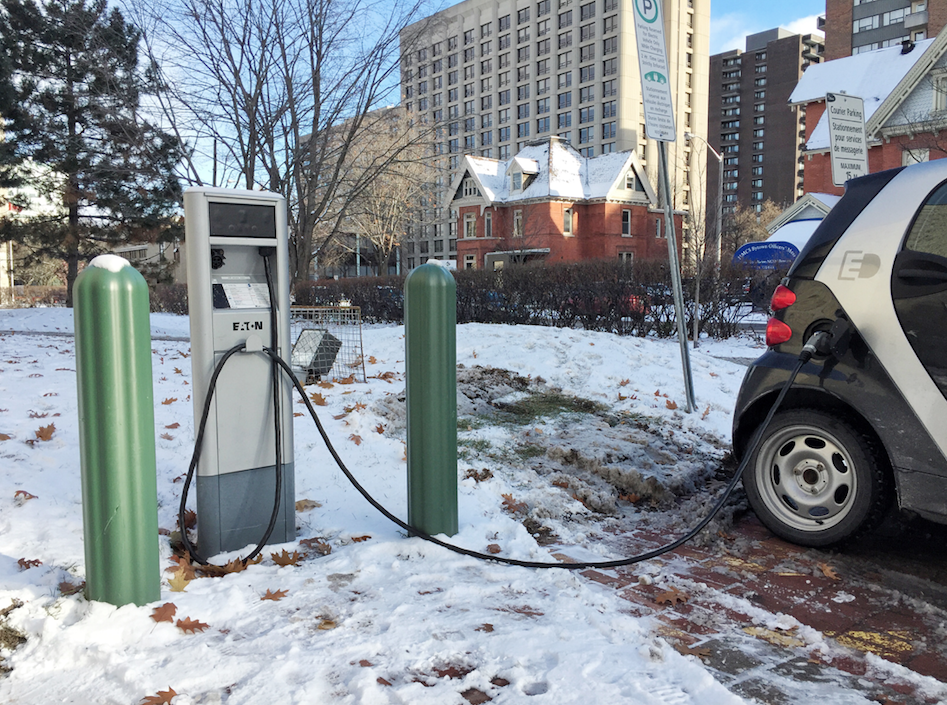City refines policy on electric cars
By Alexander Behne
The City of Ottawa is refining its policy on electric vehicle chargers in anticipation of increased adoption of electric vehicles (EVs).
The Corporate Electric Vehicle Charging Station Policy will set standardized prices for all city-owned charging stations and seek to subcontract the ownership and operation of these stations to a third-party in the same way the city’s “pay and display” parking meters are operated.
Capital Coun. David Chernushenko, chair of the city’s environment and climate protection committee, said the policy is meant to lay the groundwork for how the city will deal with electric vehicles, which are expected to become more popular in the coming years.
“It’s very hard to put a number to it,” said Chernushenko, “but we are expecting it to grow, and to grow exponentially.”
The new policy is part of the city’s push to reduce the impact gas-powered vehicles are having on the environment. Last February, city council approved a long-term target for reducing greenhouse gas emissions, which are targeted for an 80-per-cent reduction from 2012 levels by 2050.
Transportation emissions account for 40 per cent of city-wide emissions.
With the new policy for electric vehicles, pricing for EV chargers will depend on the “level” of the station in question. Level 1 stations, which operate at 120 volts, would remain free of charge for EV owners. Level 2 stations, running at 240 volts, will have a flat fee of $3.50 at Park and Ride lots and $2.00 elsewhere. Level 3 stations, also known as DC Fast Chargers and which can fully charge an EV in half an hour, will cost 28 cents per minute.
The proposed pricing, said Chernushenko, is only a tentative starting point.
“This isn’t a fixed permanent rate,” he said. “This is what our staff have recommended we start at, and we’ll get feedback and be able to respond to that.”
The city’s entire EV policy will be revised every year, at least until the regulation of EV chargers becomes commonplace. The number of public chargers at city-operated parking lots and recreation centres will likely to increase, said Chernushenko, because it’s now expected by citizens that EV chargers will be available at these locations.
Crucially, more chargers will help combat the biggest deterrent for prospective EV buyers: a phenomenon known as “range anxiety,” or the fear that a car’s battery will run out and there will be nowhere to charge it back up.
Darren Robichaud, corporate secretary for the Electric Vehicle Council of Ottawa, said most members of the group aren’t too worried about running out of juice. With newer electric vehicles boasting ranges comparable to those of even the most fuel-efficient gas-powered vehicles, most of the charging gets done at home.
“It’s kind of like the old days where you have to go to a video store to rent a movie,” he said. “No one does that anymore; they just get everything online. In this case, the energy for the car is coming right to your house. You don’t have to go out and get it.”
Robichaud said the public charging stations would mainly be of use to drivers from out of town, people who “didn’t bring their garage with them.”
Robichaud said that over the six years he’s owned his EV, a 2011 Nissan Leaf, the number of public stations in Ottawa has increased dramatically.
“When I got my electric car, there was like one public station in all of Ottawa,” he said, “and now there’s…a hundred plus.”
The City’s new EV policy is expected to come into effect pending approval by city council this month.

